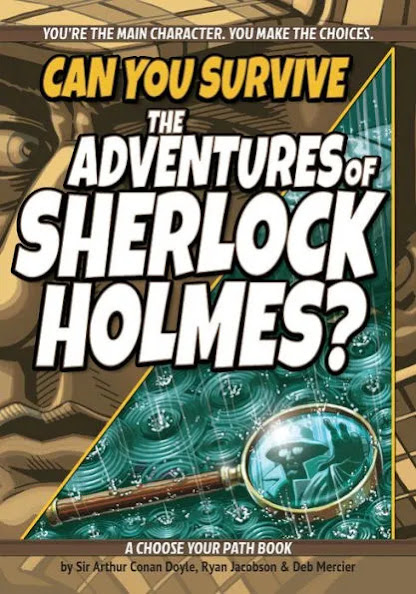Many of us encountered Sherlock Holmes at a young age, and many of us about the same time read books written in the second person, where the reader becomes a character who has to make decisions that send the story off in one direction or another. But only recently did I come across a newly published book that combines the two.
The "Can You Survive" approach to three stories from The Adventures, adapted by Ryan Jacobson and Deb Mercier, is a clever introduction to Holmes -- faithful in some respects, but not so much in others. So I put some questions to Jacobson.
Who is the ideal reader for this book?
My goal as a writer is to create books that I would’ve
enjoyed as a kid—and that’s no easy task because I was very much a reluctant
reader. My only bookish tendencies were to page through superhero comic books.
But when I was in fifth grade, my mom came home with a Choose Your Path book. I
became hooked on that format too. Reading it felt like a contest, like playing
a game. I always wanted to get through those stories without making a mistake,
without dying. I don’t believe I ever did.
Of course, one could argue that Sherlock Holmes is a superhero; I’m certainly not the first to suggest it. As such, I believe the ideal reader for Can You Survive the Adventures of Sherlock Holmes? is a middle-grader (around 8 to 12 years old) who loves playing games—including video games—and who enjoys mysteries and/or superhero stories.
How and when did you get the idea of adapting Sherlock Holmes as a can-you-survive book?
It actually began as a joke. In late 2010, my friend Liz and I laughed at the notion of turning Jane Austen’s Pride and Prejudice into a Choose Your Path book. Then I was like, “Wait a minute...” We spent the next couple of hours planning our new business venture.
When it came time to consider book options, we reviewed a
list of works in the public domain. I had an “in” with a book distributor that
specialized in nature titles, so we intentionally chose a book with nature
appeal (in order to get picked up for national distribution). That book was Jack
London’s The Call of the Wild. Our second
selection was The Adventures of Sherlock
Holmes. An iconic character, familiar stories, name recognition, it was an
obvious choice from a business standpoint. As an added
bonus, Sherlock Holmes
is my favorite character from classic literature, so I couldn’t wait to work on
a book about him.
My two business partners and I didn’t quite know what we were doing when we published these books in 2011; we made a lot of mistakes (primarily in marketing). We still managed to sell a few thousand copies, and now we’re excited to be relaunching this series more than a decade later.
How did you pick which stories to adapt?
I chose to adapt The Adventures of Sherlock Holmes, which immediately narrowed the field to 12 stories. Unfortunately, I couldn’t utilize all 12 stories because our Choose Your Path books tend to be around 160 pages in length. My co-author, Deb Mercier, and I determined that we’d be able to adapt three stories from the book. “The Adventure of the Speckled Band” was a lock. It was the first Sherlock Holmes story I ever read, and it’s still my favorite. Our second choice was more of a popularity contest. We researched lists of the most beloved stories. Not surprisingly, “The Red-Headed League” ranked highly on most lists. Our third and final story required different criteria because we intended to take some creative liberties with it. The option that fit well with what we wanted to do was “The Adventure of the Engineer’s Thumb.”
We are used to having Dr. Watson tell the tales. Why did you make Holmes the viewpoint character?
Decisions like these are largely about what appeals to our audience. I think it’s safe to assume that our middle-grade readers would prefer to become Sherlock Holmes over Dr. Watson. Of course, there’s a more technical problem with Dr. Watson: He isn’t the decision-maker in these stories. If the reader were to play the part of the good doctor, there wouldn’t be many choices to make. The story-propelling decisions all belong to Holmes, so the reader must become the consulting detective.
Some Sherlockians may be dismayed at the paths that end in Holmes being wrong and even ceasing to be a detective. How would you respond to that?
I love this question. It’s something I never considered. Hopefully, I can appease the Sherlockians by saying the main character isn’t exactly Sherlock Holmes; it’s the reader trying to be Sherlock Holmes. When Holmes is right, it’s because the reader was right. When Holmes is wrong, well, that’s also the reader. Those wrong paths do need to end with some sort of finality. I believe having Holmes cease to be a detective plays better than having some random mishap befall him. I hope readers of the book agree.
Can You Survive The Adventures of Sherlock Holmes will be released on Oct. 11 by Lake 7 Creative.

No comments:
Post a Comment